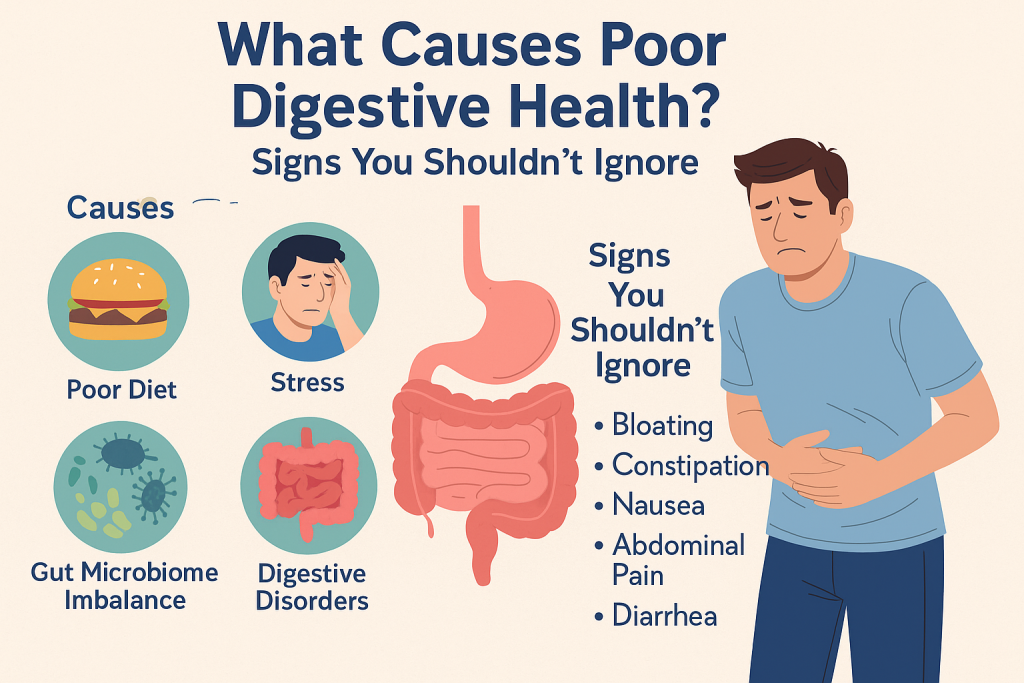
Understanding the Importance of Digestive Health
Your digestive system plays a critical role in maintaining your overall health, from nutrient absorption to immune system support. When it’s functioning properly, you may not give it much thought. But when it doesn’t, you’ll quickly notice symptoms that can disrupt your daily life.
So, what causes poor digestive health? It’s often the result of a combination of lifestyle, dietary choices, infections, chronic conditions, or even stress. Recognizing the signs early can help prevent more serious gastrointestinal issues.
Common Causes of Poor Digestive Health
1 . Poor Diet and Nutritional Deficiencies
A diet high in processed foods, sugar, and unhealthy fats is one of the leading causes of poor digestive health. Lack of dietary fiber, water, and essential nutrients can lead to issues like constipation, bloating, and inflammation.
- Foods that hurt digestive health:
- Fried and greasy foods
- Excessive red meat
- Sugary snacks and sodas
- Artificial sweeteners and preservatives
2. Stress and Anxiety
Your gut is closely connected to your brain. Chronic stress and anxiety can disrupt the gut-brain axis, leading to changes in bowel habits, acid reflux, and abdominal pain. Stress-related conditions like Irritable Bowel Syndrome (IBS) are common in patients with long-term anxiety.
3. Gut Microbiome Imbalance
The gut is home to trillions of bacteria that help break down food, produce vitamins, and protect against harmful pathogens. Antibiotic overuse, poor diet, or illness can disrupt this balance, leading to dysbiosis — an unhealthy shift in gut bacteria — which contributes to inflammation, bloating, and indigestion.
4. Chronic Digestive Disorders
Medical conditions can be at the root of chronic digestive problems. These include:
- Inflammatory Bowel Disease (IBD) such as Crohn’s disease and ulcerative colitis
- Celiac disease
- Gastroparesis or slow gastric emptying
5. Dehydration and Lack of Physical Activity
Water helps break down food and absorb nutrients. Dehydration can slow digestion and lead to constipation. Similarly, a sedentary lifestyle slows down intestinal motility, which can result in bloating and irregular bowel movements.
Warning Signs You Shouldn’t Ignore
It’s easy to dismiss occasional bloating or indigestion, but persistent symptoms might signal a more serious issue. Look out for:
- Frequent bloating and gas
- Unexplained weight loss
- Acid reflux or heartburn
- Stomach cramps or abdominal pain
- Blood in stool
- Persistent fatigue
If these symptoms last more than a few days or worsen over time, it’s best to consult a gastroenterologist.
How to Improve Digestive Health
Prioritize a Fiber-Rich Diet
Eat whole grains, fruits, and vegetables daily. Dietary fiber supports bowel regularity and feeds good gut bacteria.
Stay Hydrated
Drink at least 8–10 glasses of water a day to aid digestion and prevent constipation.
Add Probiotics and Prebiotics
Incorporate foods like yogurt, kefir, kimchi, bananas, and garlic to promote a healthy gut microbiome.
Manage Stress
Techniques like meditation, yoga, and deep breathing can lower stress and reduce gut flare-ups.
When to See a Digestive Specialist
Don’t delay care if you experience:
- Blood in your stool
- Sudden changes in bowel habits
- Severe or long-lasting abdominal pain
- Unintended weight loss
Dr. Karim Shakoor, a board-certified gastroenterologist at Colon & Digestive Health Specialists offers comprehensive evaluations and treatment for chronic digestive conditions.
Book Your Consultation Today
Early intervention can prevent complications and help you regain digestive balance. Schedule a visit with Dr. Shakoor to receive expert guidance and a personalized digestive health plan.
